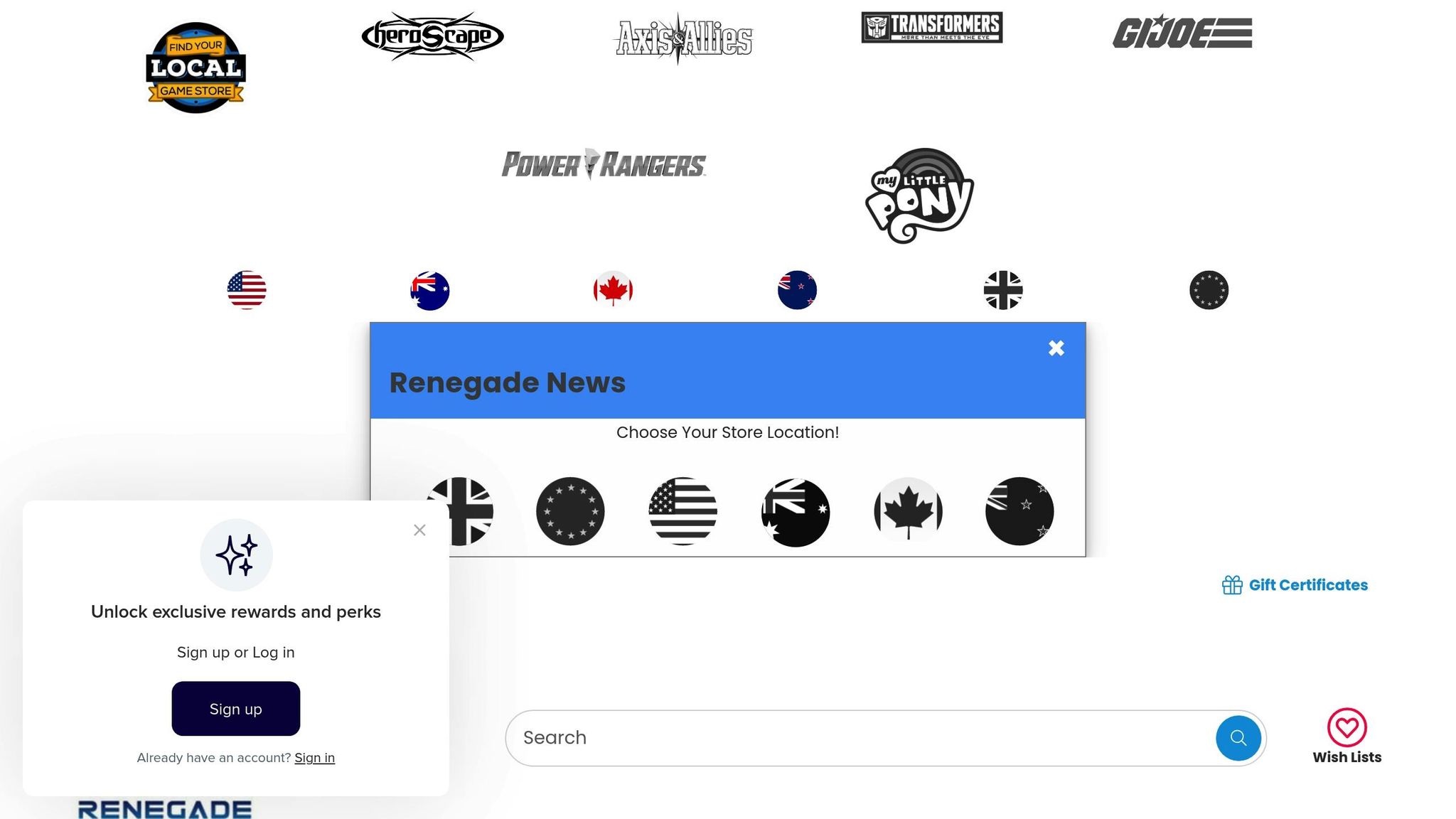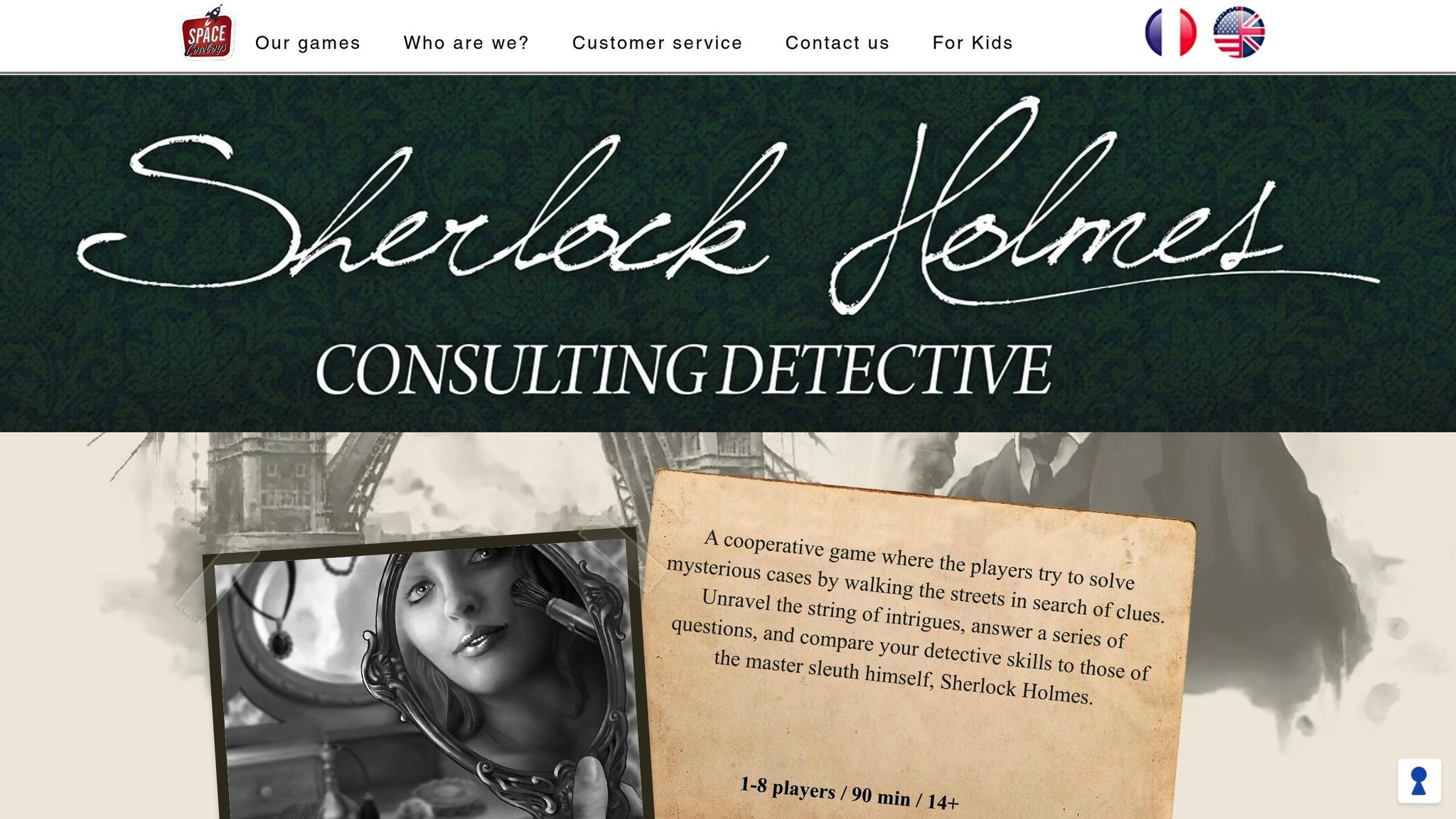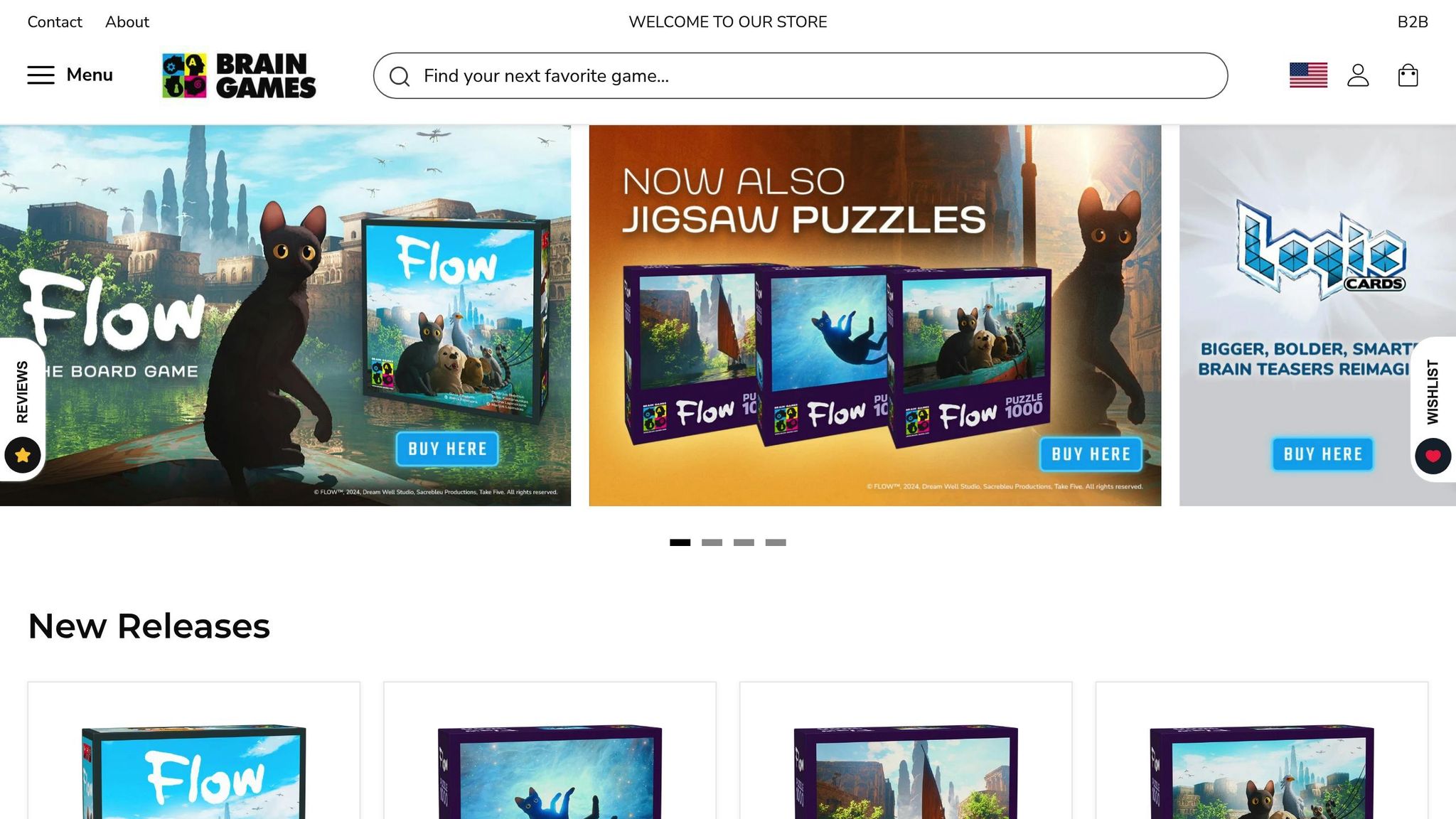Discover the Best Board Games for Every Player

Brain-Bending Logic: Games That Test Your Reasoning Skills
Logic board games are a fun way to sharpen your reasoning and decision-making skills. Unlike games based on luck, these challenges reward strategic thinking, pattern recognition, and deduction. Whether you're solving mysteries, planning moves ahead in chess, or using clues to find hidden answers, these games help you think critically in an enjoyable way.
Here’s why they work:
- Boosts critical thinking: Improves memory, problem-solving, and decision-making.
- Social benefits: Encourages teamwork and clear communication.
- Immediate feedback: Learn and adjust strategies quickly.
- Accessible for all: Many games offer different difficulty levels to match your skill.
Popular examples include chess for strategy, The Search for Planet X for deduction, and Sherlock Holmes Consulting Detective for collaborative problem-solving. These games are perfect for anyone looking to have fun while improving their mental skills.
Top 10 Games That Teach Logic
What Makes a Good Logic Board Game
The best logic board games have specific features that challenge your reasoning skills and keep you engaged. Understanding these elements can help you pick games that truly sharpen your mind. These features are designed to test your thinking while offering diverse and enjoyable gameplay.
Core Game Features
Simple rules, deep strategy. The most effective logic games have straightforward rules that you can learn in about 15-20 minutes, but they create complex scenarios that keep the game intriguing. Take chess, for example: learning how the pieces move is quick, but mastering the strategies can take a lifetime.
Multiple ways to win. Great logic games let you solve problems in different ways, encouraging creativity rather than relying on memorized strategies. This variety means you can play the same game multiple times and still discover fresh approaches.
Adjustable difficulty levels. Games with scalable challenges remain engaging, even after repeated plays. Look for options with variable setups, adjustable difficulty settings, or expansion packs to keep things interesting as your skills grow.
Managing incomplete information. The best games require you to juggle multiple pieces of information and make decisions based on limited data. This mirrors real-world logical thinking, where we often have to make choices without knowing everything.
Decisions that matter. Unlike puzzle games where the solution is fixed, logic games make every choice impactful. Each move you make influences the rest of the game, forcing you to think ahead and weigh the consequences of your actions.
Player Requirements
Beyond the mechanics, the overall experience depends on practical factors that suit your preferences and lifestyle.
Age-appropriate challenges. Don’t just go by the recommended age on the box. Consider the level of abstract thinking required. A well-designed logic game can challenge players of all ages, as long as it matches their cognitive abilities.
Works well with any group size. The best games are equally engaging whether you’re playing one-on-one or with a group of four. This flexibility ensures the game fits a variety of situations.
Time commitment that fits your schedule. Some games are perfect for a leisurely 90-minute weekend session, while others are better suited for quick weeknight play. Think about how much time you can realistically dedicate to playing and choose accordingly.
A sense of progression. Look for games that let you improve over time. A gradual learning curve with clear milestones makes the experience rewarding, as you feel like you’re developing skills rather than relying on luck.
Ease of setup and maintenance. Games with complicated setups or lots of tiny pieces can be a hassle, making you less likely to play them regularly. On the other hand, streamlined games with minimal components are easier to store, prepare, and enjoy more often. Consider how much effort you’re willing to put into setup compared to actual playtime.
Best Logic Board Games to Test Your Reasoning Skills
If you enjoy putting your reasoning skills to the test, these board games are worth exploring. Each one takes a unique approach to challenge your logical thinking.
Chess: The Classic Strategy Game
Chess is the ultimate test of strategy and foresight. With its straightforward rules and deep gameplay, it’s a game where every move matters. There’s no element of chance - your success depends entirely on your ability to plan ahead and outthink your opponent. This timeless game remains a favorite for sharpening logical reasoning and strategic thinking.
The Search for Planet X: Science-Based Deduction

For a modern twist on deduction, The Search for Planet X turns a scientific quest into a brain-teasing puzzle. Players take actions like sweeping sectors with a telescope, analyzing relationships between elements, and narrowing down possibilities to uncover the elusive Planet X. A companion app provides private clues, while public actions force players to think strategically about their deductions.
Winning isn’t just about finding Planet X - you'll need to publish theories using facedown chits to earn points, adding another layer of strategy. Erik Twice gave it a ★★★★ rating, praising its thoughtful mechanics and replayability. The game offers adjustable difficulty levels and shines with three to four players, though it works well with fewer participants too.
Sherlock Holmes Consulting Detective: Team-Based Logic

Sherlock Holmes Consulting Detective takes logic and deduction into a collaborative experience. Players work together to solve intricate mysteries by gathering clues, interviewing witnesses, and analyzing detailed case files. While many find themselves falling short of Sherlock Holmes’ scores, the immersive storytelling and cooperative gameplay make it a favorite among fans of narrative-driven challenges.
sbb-itb-1ed942f
How to Choose the Right Logic Game
Finding the right logic game means picking one that matches your current skill level and offers the kind of challenge you’re looking for. It’s also important to consider how the game’s features align with your abilities and goals.
Matching Games to Your Skill Level
When selecting a logic game, it’s helpful to look for difficulty ratings like Beginner, Intermediate, Advanced, or Expert. These labels can guide you toward games that provide just the right level of challenge - avoiding the frustration of games that are too easy or overly complicated.
For memory-based games, the size of the grid can be a good clue. Smaller grids, like 3x2, are generally easier, while larger grids, such as 8x6, are designed for more advanced players. This simple visual cue can help you decide if a game aligns with your current abilities.
In digital games, features like "Daily Challenges" or "Expert Mode" can help you test your skills as you progress. A great example is Number Match, which boasts a 4.5/5 star rating from over 434,000 reviews on Google Play. Players appreciate how it starts with easy-to-learn basics but scales up to harder daily puzzles.
If you’re just starting out, consider games that offer multiple difficulty levels within the same title. This allows you to grow at your own pace without needing to switch to a new game every time you’re ready for a tougher challenge.
Getting New Players Started
Once you’ve matched a game to your skill level, it’s time to ease into the gameplay - especially if you’re new to logic games.
Look for shorter games that provide quick wins and instant feedback. These can help build confidence and keep you motivated.
User reviews can also be a goldmine of information. They often highlight common issues, like bugs that block access to certain difficulty levels, which can be discouraging for beginners. Reading these reviews can help you avoid games with frustrating flaws.
Choose games that strike a balance between being beginner-friendly and offering clear progression. Titles that gradually introduce more advanced mechanics are ideal for helping you build skills over time.
Lastly, take advantage of free versions or demos when available. Many digital logic games offer trial options, allowing you to get a feel for the gameplay and difficulty level before committing to a purchase. It’s a risk-free way to find the perfect match for your needs.
Conclusion: Improve Your Logic with Brain Games

Logic board games do more than just entertain - they push your reasoning skills to new heights while sparking meaningful connections with others. Whether you're mastering chess strategies, solving tricky deduction puzzles, or diving into family-friendly challenges, these games offer long-lasting mental rewards.
Since 2004, Brain Games has been dedicated to delivering these mind-bending experiences to players. As a trusted board game publisher and retailer, we know what makes a logic game truly engaging. Our collection includes everything from beginner-friendly games for families to advanced strategy titles, ensuring there's always a fresh challenge waiting for you.
What makes Brain Games stand out? Our focus on quality and your satisfaction. With our Game Exchange Guarantee, you can try any logic game with confidence - if it’s not the right fit within two weeks, exchange it for another. For games published by Brain Games Publishing, we take it a step further with a Lifetime Guarantee on components, so your favorite games stay in play for years.
Ready to strengthen your reasoning skills? Explore Brain Games' catalog to find your next logic game. Whether you're browsing exclusive Brain Games Publishing titles or exploring the world's top strategy games, you'll discover the perfect match to sharpen your mind and create unforgettable moments with family and friends.
Your path to sharper thinking starts with the right game - and Brain Games is here to guide you every step of the way.
FAQs
How do logic board games help develop critical thinking and decision-making skills?
Logic board games are a fantastic way to sharpen critical thinking and decision-making skills. They push players to identify patterns, evaluate different options, and anticipate future moves. This kind of mental exercise boosts cognitive abilities like reasoning, problem-solving, and adaptability.
These games also engage the brain's prefrontal cortex - the part responsible for focus, strategic planning, and decision-making. Over time, this can improve your ability to approach challenges thoughtfully and make well-informed choices, whether you're playing a game or navigating real-life situations.
What should I consider when picking a logic board game that matches my skill level?
When choosing a logic board game, start by assessing your experience level. If you're new to these games, opt for ones with simple rules and clear goals that are easy to understand. For seasoned players, go for options that involve strategic depth or thought-provoking challenges to test your problem-solving skills.
Another factor to weigh is the balance between skill and luck. The best games keep you engaged without leaning too much on random chance or becoming frustratingly hard. Lastly, check if the game includes adjustable difficulty levels or variations, so it can cater to a range of abilities and provide fun for everyone.
What’s the best way to introduce logic board games to beginners without making it too complicated?
To get beginners started with logic board games, it's best to pick simple games with easy-to-follow rules and clear goals. Cooperative games, where players work together as a team, can be a great introduction. These games let new players practice problem-solving without the pressure of competition. For kids, family-oriented games with guided play can make the experience even more enjoyable.
Another option is to choose games that become more challenging over time. These titles let players build their skills gradually, boosting their confidence along the way. Creating a relaxed and enjoyable atmosphere is key - it helps newcomers have fun while honing their reasoning abilities.






